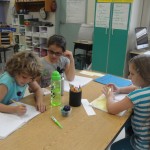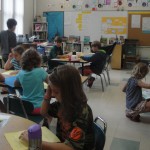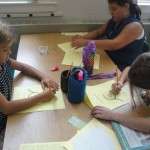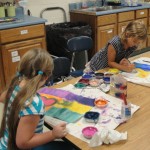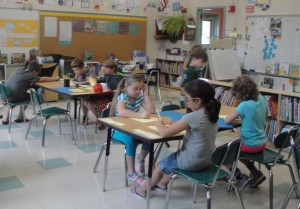 These last couple of days have been tough – almost too hot to move, and your children have really given it their all. One of the things we are working on is building habits of stamina and focus. The heat of the past days have doubled that challenge, but the children have done well through it all. You’d have been proud of them. We are all grateful that cooler days seem to be heading our way.
These last couple of days have been tough – almost too hot to move, and your children have really given it their all. One of the things we are working on is building habits of stamina and focus. The heat of the past days have doubled that challenge, but the children have done well through it all. You’d have been proud of them. We are all grateful that cooler days seem to be heading our way.
Establishing Our Class Constitution –Social and Emotional Learning
Developing Relationships With Others
This week we began listing things we each try to do to be successful. We combined this discussion with one from last week where we discussed how our actions affected others. We listed behaviors that would be helpful so that everyone could learn and do his or her best. Individually the children looked through those lists to select the behaviors most important for their learning. They also selected the behavior they find most challenging – most chose being focused, quiet or not distracting to others.
This week we read Junkyard Wonders by Patricia Polacco. (I highly recommend this book. There is much to talk about through this amazing true story – caring, kindness, difference, strength, change and confidence.) We used it as a basis for examining learning differences and challenges. Those discussions lead us to our final list that we worded into our classroom constitution.
We of 3E will:
Treat each other kindly
Be honest
Treat others as we would like to be treated
Respect others
Get to know each other, share and make friends
So that each and every one of us in 3E can do our best learning.
Each week we will spend some time reflecting on how well we each lived up to our constitution – what did we do well and what we could work on. Certainly if we can work in our classroom and school, both individually and collectively, according to our statement we will have an amazing year of learning and friendship.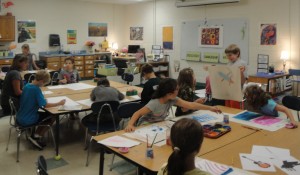
Intelligence Grows – Social and Emotional Learning
Knowing Yourself
Since introducing Multiple Intelligence Theory we have been trying to identify how different book characters, both real and fictional, are smart. “How Are You Smart?” is the title of a book that shares brief paragraphs and poems about accomplished people who display strengths in each of the intelligences. That is why we have adopted that question as we explore interests and individual preferences to understand how we learn, what our individual strengths are and “how we are smart”. We are working to become more aware of our inner voice and what is happening inside our minds. This is developmentally challenging. Third graders are in a transitional stage when it comes to this kind of reflection. They are becoming more flexible in their thinking and better able to connect experiences through inferences. Even with incomplete knowledge of situation or topic, they are beginning to able to make reasonable judgments based on what they know and think. It is exciting to see the children puzzle through this hard work. How often do you stop to think, “in choosing this, how will it influence learning?” Or “when I do this, how am I helping others learn.”
Right now as we struggle with questions like “what do you do to be successful” or “what is happening in your mind when you understand” the answer is often “I don’t know” or “I’m not sure.” Through the course of the year the children will become more aware of what is happening in their minds. John Dewey said, “Reflective thinking is called for when people recognize that some problems cannot be solved with certainty.” Being aware of options and choices, outcomes and consequences is something that will grow through our work to understand ourselves as learners.
Again we used the story of Patricia Polacco as told to us through her books Dear Mr. Falker and Junkyard Wonders to realize that how we are smart grows and changes. She did not learn to read until 5th grade and she was placed in a classroom where all the children who were considered different were schooled. At that point in her life she would not have been considered word smart at all, but as we looked at the huge pile of books she has written we knew she definitely was word smart now. Through her example we know we can do anything and we can develop any intelligence we set our mind on. We know that “how we are smart” grows and changes through our choices and efforts and that’s a pretty exciting thing to know.
Becoming Flexible with Numbers and Amounts
This week we began our Numbers of the Week routine. It is something that will be happening in each of the 3rd grade classrooms and has been designed to help the children think more flexibly by asking them to do a variety of things with the same amounts. The routine can also help them develop understanding of different terms and mathematical vocabulary.
On Monday the children write the amounts in standard, word and expanded forms, along with representing the amount in two different ways with base 10 blocks. On Tuesday they find the sum and the difference and check their work with rounding to the nearest ten. On Wednesday they generate alternating patterns by adding and subtracting. On Thursday they write problems for others to solve, and on Friday they find two different ways to represent the numbers with money.
This week the numbers were small – 13 for the number of students in 3E and 39 for the number of students in 3rd grade. These amounts helped us understand each part of the routine. We’ll see what next week brings when we compare the number of students in 3rd grade with the total number of primary students in our school, Pre K through 3.
As I write this and stop to think of all the reading, writing, word study, science, math and social/emotional learning work that we have been doing for the last twelve days I am amazed. Already we have accomplished a lot. Your children are hard working and fun loving. They are becoming more aware of how to use time wisely and make more skillful transitions from one activity to the next. They are considering how their actions affect success. They seem to be settling into the routine of our day and week and growing in confidence. All wonderful things.
Bits and Pieces – ask your child about:
- …Emily Wiggins, the main character of our chapter read aloud,
- … our personal narrative work,
- … starting cursive handwriting practice with the “clock climbers,
- … preparing for Dot Day, September 16th,
- … finding and leaving comments on our blog (We’d love to hear from you.), or
- … what s/he is reading and writing.
